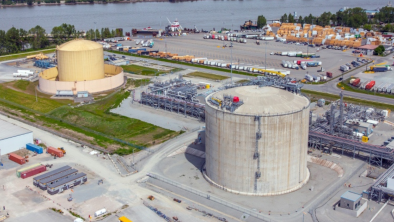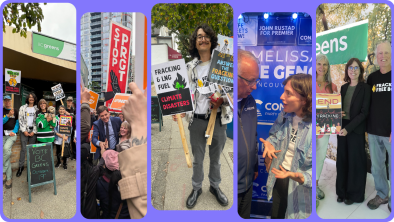Peter McCartney: It’s back! Massive subsidies are quietly reviving LNG

Photo: LNG Tanker Ship
While most of the media and environmental movement's attention has rightfully been on the Trans Mountain pipeline, another much-delayed, heavily subsidized fossil-fuel export project is rearing its polluting head once more: LNG Canada in Kitimat.
And like the southern pipeline, this liquefied natural gas (LNG) terminal wouldn’t be moving forward without our governments propping it up with billions of dollars in tax breaks and subsidies.
That’s a problem because it would be one of the most polluting projects in the country. Once it’s finished, it will create nearly as much carbon pollution as all the passenger vehicles in the province combined.
Our leaders have promised to end fossil-fuel subsidies, but they’re doing just the opposite. We’ve already agreed to sell power to LNG producers at less than half what it costs to produce it, and the fracking industry in B.C. gets $271 million per year worth of special drilling tax credits.
In March, Premier John Horgan announced another $6 billion worth of tax breaks for the LNG Canada project, despite having criticized the last provincial government for its LNG incentives. He scrapped a special LNG tax, postponed the PST on construction materials, and exempted the industry from any future carbon tax increases.
“Shell does not need handouts from the government,” Horgan said back in 2013.
Now he’s going far above and beyond what even former premier Christy Clark offered. He’s even taken up the tired talking points of “the cleanest LNG in the world” and “getting China off of coal”.
B.C. LNG is just as likely to replace nuclear power plants or price out renewable energy projects as it is to take coal plants offline. And no branding exercise can prevent the thousands of new fracking wells that would accompany the project in northeastern B.C. from leaking highly potent methane gas into the atmosphere.
We’re asked to accept this damage to our global climate because of jobs, but our governments seem more than willing to sell out the workers who would supposedly benefit from this proposal.
LNG Canada is asking the federal minister of finance to remove a 45.8 percent tariff on imported fabricated steel to allow the company to build its plant overseas using cheap labour and materials before assembling it here.
This is one of the key reasons the plant has yet to move forward, and with all signs pointing to an imminent final investment decision, prepare for the federal government to waive this tariff any day now.
But none of this compares to the biggest subsidy of all—the price of pollution. This project will increase B.C.’s annual carbon emissions by 8.6 megatonnes (MT) when we have already agreed to lower them 14 MT by 2030.
That means over the next decade, British Columbians will have to work 61 percent harder to cut carbon pollution—and spend so much extra to do it.
By 2050, the task becomes all but impossible. B.C. has promised to cut emissions down to 13 MT by mid-century, but LNG Canada would be responsible for about three-quarters of that target.
Every other sector of the economy—forestry, technology, agriculture, and tourism—would have to effectively cut its pollution to zero in order to offset this one single project. It’s already going to be incredibly tough to make this transition and we should not make it that much harder on ourselves to do so.
Our track record so far is abysmal. We’ve already missed our 2020 provincial goals. What makes Premier Horgan think future governments will be ready to go the extra mile when for every decade we delay climate action, it costs us 40 percent more?
If we fail to meet these targets the cost is unthinkable. Canada estimates the social cost of carbon—or the price society pays for the impacts of climate change—at $74.80 per tonne by 2050. That means by mid-century, pollution from LNG Canada alone will cost roughly $718 million a year for social costs, including firefighting expenses and flood relief.
All of these public subsidies—lower power rates, drilling credits, tax and tariff exemptions, emissions reductions, and climate costs—dwarf any resource revenue the project may eventually bring in.
Horgan’s tax breaks for LNG producers are less about the northern economy and more about building something that the B.C. Liberals couldn’t. He’s using the same shoddy logic to justify even more outrageous giveaways, and British Columbians will pay the price.
Peter McCartney is the climate campaigner at the Wilderness Committee.
To see original article in the Georgia Straight click here.


